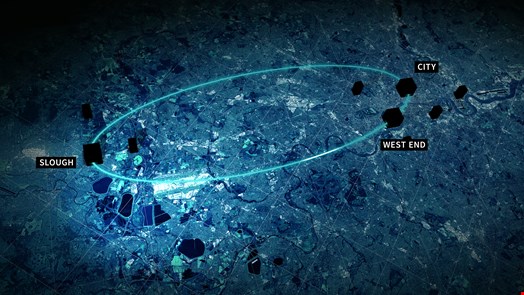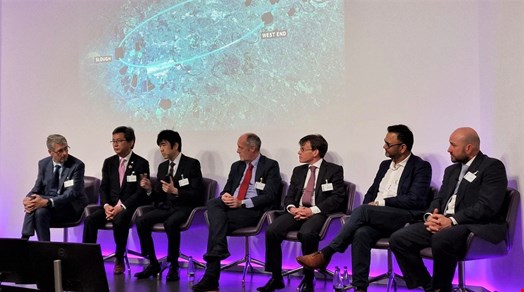At an event held yesterday at BT Tower, London, BT, Toshiba and EY announced the launch of a world-first commercial trial of a quantum secured metro network (QSMN).
The infrastructure aims to connect various customers across London, securing the transmission of valuable data and information between multiple physical locations over standard fiber-optic links using quantum key distribution (QKD).
BT and Toshiba originally announced their commitment to creating a trial network in October 2021. “The brand-new network will connect sites in London’s Docklands, the City and the M4 corridor, and will provide data services secured using QKD and post-quantum cryptography (PQC),” the statement read.
The network’s first commercial customer, EY, will utilize the network to connect two of its sites in London located in Canary Wharf and London Bridge.
The network will be operated by BT, providing a range of quantum-secured services, including dedicated high bandwidth end-to-end encrypted links, all of which are delivered over Openreach’s private fiber networks. QKD hardware and key management software will be provided by Toshiba. In the network, QKD keys will be combined with the in-built ethernet security, based on public key based encryption, which will enable the resultant keys to be used to encrypt the data.

Preparation, technical deployment and testing for the network took place in late 2021. This included equipment deployment in racks, adding security systems and resilience testing and finally running and optimizing the network. Although the official launch of the network took place yesterday, it has been running since early April, and will operate for an initial period of up to three years.
QKD plays a fundamental role in protecting networks and data against growing cyber-attacks from quantum computing. The London network represents a crucial step towards reaching the UK government’s strategy to become a quantum-enabled economy.
The UK Government’s “strategic intent” over the next 10 years is to create a ‘quantum enabled economy,’ in which quantum technologies are an integral part of the UK’s digital backbone and advanced manufacturing base, unlock innovation across sectors to drive growth and help build a thriving and resilient economy and society and contribute significant value to the UK’s prosperity and security.
To achieve this, the UK Government aims to make the UK a global center of excellence in quantum science and technology development, the ‘go-to’ place for quantum companies or for global companies to locate their quantum activities and a preferred location for investors and global talent.
Speaking at the launch, Howard Wilson, CTO of BT, said: “Our 2030 ambition is to be the world’s most trusted connector of people, devices and machines.” He added that “quantum technology is with us – we are in a global race. Communication services are more critical than ever. Quantum computers will soon be powerful enough to challenge much of the world’s cryptography. This presents a significant threat to to the way business is done and, therefore, an opportunity. Communication services are more critical than ever.”
“Quantum-enabled technologies are expected to have a profound impact on how society and business operate in the future, but they are remarkably complex to understand, develop and build: in particular, ensuring that the end-to-end service designs meet the stringent security requirements of the market. I’m incredibly proud that BT and Toshiba have successfully united to deliver this unique network, and with EY as our first trial customer, we are paving the way for further commercial explorations for quantum technologies and their use in commercial and societal applications in the future,” he commented.
Wilson added that this is a significant moment in the UK’s journey towards a quantum-enabled economy, although we’re not there yet: “Further investment commitments will be required to broaden the study of quantum technologies that will contribute to this new economy, including quantum computing, quantum cryptography and quantum communications. We look forward to working with our government and industry partners to continue the momentum BT has started and shaping the UK’s quantum strategy.”

Shunsuke Okada, corporate senior vice president and chief digital officer of Toshiba, also took to the podium and announced that the quantum economy is a multi-trillion dollar industry with a projected four billion users. The main need for this, however, concerns security: “We have to think about long-term information security. Confidential information is government, financial, medical, corporate and critical national infrastructure information,” he stated. “All of this is currently under threat.”
“Both Toshiba and BT have demonstrated world-class technology development and leadership through decades of innovation and operation. Combining BT’s leadership in networks technologies and Toshiba’s leadership in quantum technologies has brought this network to life, allowing businesses across London to benefit from quantum secured communications for the first time,” he added.
Andrew Shields, head of the quantum technology division, Toshiba Europe, explained how quantum key distribution works: “In quantum communications, each bit is encoded on a single photon. Secrecy can be tested directly because quantum theory dictates that eavesdropping unavoidably alters the encoding of single photons. All of this means that we can detect unauthorized eavesdropping on fiber and distribute secret digital keys that are secure from all future advances in cryptanalysis and computers, even secure from a quantum computer.”
The Toshiba QKD System, developed in Cambridge, UK, offers “world-leading performance,” remarked Shields. This includes the highest secure rates, auto set-up and alignment, integrated network key delivery, operation on data carrying fiber and ETSI standardized interface.
Andrew Lord, senior manager research, optical networks, BT, also took to the podium, answering the pressing question of ‘how does the London quantum secured metro network work?’ He specified that “this is a three-year metro-based quantum trial containing a three-mode London exchange ring, connections to trial, connections to trial customer sites and a testbed to develop quantum-secured network services.”
Praveen Shankar, EY UK & Ireland managing partner for technology, media and telecoms (TMT), detailed how EY is preparing for the quantum era: “EY are reimagining our own business and getting ready for the quantum era. This will give us hands-on experience protecting our data from future quantum-based cyber-attacks, including customer and employee data.”
“We will be helping our clients reimagine their business using quantum. They can come to our offices and see quantum in operation,” he added. “Quantum technology creates new and significant opportunities for business, but presents potential risks. Quantum secure data transmission represents the next major leap forward in protecting data, an essential component of doing business in a digital economy. Our work with two of the world’s leading technology innovators will allow us to demonstrate the power of quantum to both EY and our clients.”
In a press release, George Freeman, Minister for Science, Research and Innovation, HM Government, commented: “I am very pleased to see the first trial by BT and Toshiba of a commercial quantum secured metro network, which represents significant progress towards achieving our ambition to make the UK a quantum-enabled economy. This is the kind of innovation that helps cement the UK as a global innovation economy in the vanguard of discovering, developing and commercially adopting transformational technology with real societal benefits.”
